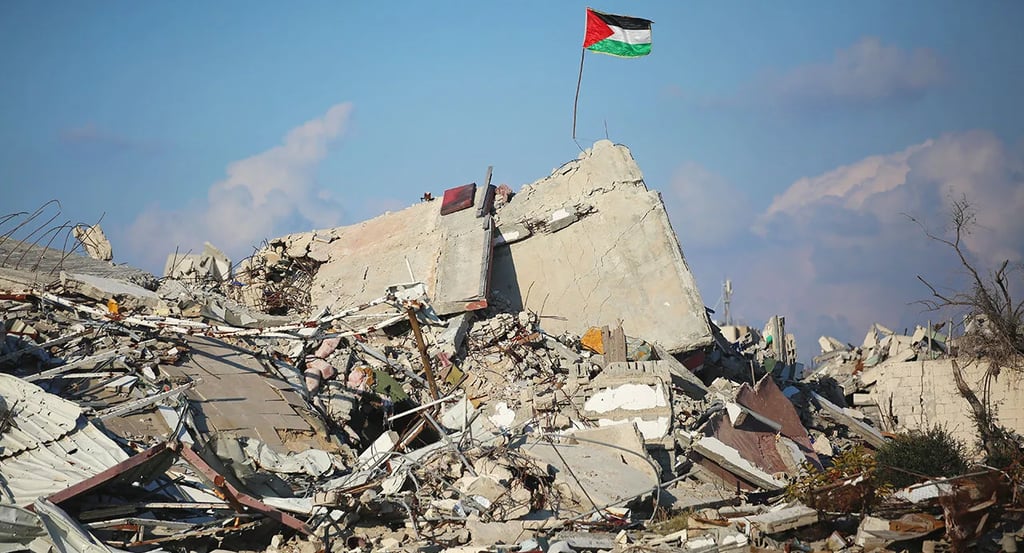Gaza's Future: Reconstruction Between Just Solutions and the Forced Displacement Plan
Rebuilding Gaza after the recent conflict presents a complex political and humanitarian challenge. Concerns arose following proposals to link reconstruction to the displacement of Gazans
Ahmed Gamal El Sayyad, Political Researcher
2/18/20252 min read


Rebuilding Gaza after the recent conflict presents a complex political and humanitarian challenge. Concerns arose following proposals to link reconstruction to the displacement of Gazans, a prospect firmly rejected by Arab nations like Egypt, Jordan, and Saudi Arabia. In this study, African Narratives analyzes the feasibility and ethical implications of different reconstruction approaches, contrasting solutions that uphold Palestinian rights with those that propose or enable forced displacement.
Reconstruction is more than just rebuilding; it's about upholding Palestinian rights. Instead of displacement, efforts should focus on rebuilding Gaza, ensuring residents retain their land rights. Historical precedents prove successful reconstruction is possible without displacement.
Gaza has been rebuilt before after repeated destruction. The 2014 Cairo Conference for Reconstruction is a key example. Today, international diplomacy seeks Gaza's rebuilding while safeguarding rights, requiring Arab and international coordination against forced displacement.
Trump's Statements and Displacement Plans:
President Trump's Gaza plans included potential displacement, suggesting Egypt and Jordan accommodate Gazans permanently. This was rejected for its potential to destabilize the region, strain relations, and impede normalization efforts. Saudi Arabia sees such proposals as a threat to regional stability. Arab nations stand united against displacement.
Reconstruction vs. Displacement: An Economic Perspective:
Displacement would trigger new refugee flows into Europe, straining asylum systems already facing challenges. Hosting refugees is costly; for example, Germany spent billions in 2017 on refugees. UN estimates place Gaza's reconstruction costs at roughly $53 billion. The annual cost of hosting a million refugees would quickly surpass this figure, making reconstruction the more sustainable and just economic solution.
Learning from History: Gaza Reconstruction Scenarios:
Despite claims that rebuilding Gaza necessitates displacement, history demonstrates otherwise. Post-WWII Europe, including heavily damaged Germany, rebuilt successfully without displacing populations. Gaza itself has been reconstructed after previous conflicts, like after the 2014 war.
Current efforts prioritize keeping Gazans in Gaza, potentially dividing the Strip into humanitarian zones with temporary housing while rubble is cleared. Gazans' presence shouldn't be seen as an obstacle. Displacement is an unjust denial of rights and a liquidation of the Palestinian cause. Addressing the conflict's root causes offers a path to lasting peace.
Conclusion: A Shared Responsibility for Justice:
Gaza's reconstruction demands comprehensive solutions guaranteeing a decent life for its residents on their land. Efforts must prioritize stability, improved services, and avoid imposing unacceptable solutions. Past experiences show political will and international cooperation can overcome challenges. A clear plan is needed to ensure just reconstruction, guaranteeing Palestinians' right to remain and access essential living conditions.
Reconstruction is a collective responsibility. Regional and international actors must support this process, enhancing stability and preserving Palestinian rights, rejecting any attempts to alter the demographic reality through displacement.
Download full study here (EN / AR)
Empowerment
Amplifying African voices for sustainable progress together.
Contact US
Growth
Street No. 3281, N'Djamena, Republic of Chad.
© 2024. All rights reserved.